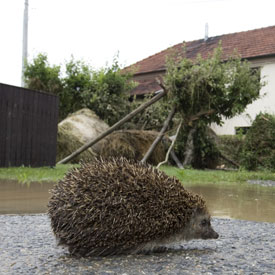Hedgehogs and red squirrels still under threat
A study shows that while over half of the UK’s mammals are doing well, numbers of certain species like hedgehogs and the red squirrel have declined in the last ten years.
Despite efforts to protect Britain’s mammals, some of our best-loved species are still under threat, a report warns.
An assessment of how UK mammals have fared in the last ten years shows that while there had been some notable successes, including the revival of otters which have bounced back from the brink of extinction, it’s not all good news for the rest of the mammals.
But key species such as red squirrels, Scottish wildcats, water voles and mountain hares have declined, while hedgehogs, particularly in rural areas, are also in decline.
According to the 2011 State of Britain’s Mammals study, produced by Oxford University experts for the People’s Trust for Endangered Species, hedgehogs have declined from 30 million in the 1950s to an estimated 1.5 million 40 years later.

Red squirrels numbers have also seen a dramatic reduction of more than 50 per cent over the past 50 years with the introduction of grey squirrels from North America.
And populations of Scottish wildcats are now estimated at fewer than 400 animals, making them critically endangered.
Report author Professor David Macdonald said: “There have been plenty of successes, otters returning through cleaner rivers, polecats returning with more educated and benign gamekeeping, water vole reintroductions in the face of habitat restoration and mink control.”
But he said: “We expect the future of red squirrels to be confined to a few islands, such as Anglesey and the Isle of Wight, or in the Highlands of Scotland.”
“Hedgehog numbers, especially in farmland, are down in a big way,” Professor David Macdonald, author
Red squirrels have been hit by invasive grey squirrels, which compete with reds for food and carry a disease which is fatal to their native cousins.
And with hedgehog populations tumbling from 30 million in the 1950s to around 1.5 million, they are also threatened.
“Hedgehog numbers, especially in farmland, are down in a big way,” Prof Macdonald said.
There was also a need to consider reintroductions of extinct species, such as the beaver which has been brought back to Scotland in a trial scheme in Knapdale.
“We should be thinking about beaver reintroductions in Wales and England in the course of the immediate future,” he said.
It was not only a matter of holding the line, but also of creating a natural world that was fit for purpose, he said.
He said beavers were easy to control, did not do much damage and had a considerable capacity to generate eco-tourism and manage the watercourses and landscape they live in.